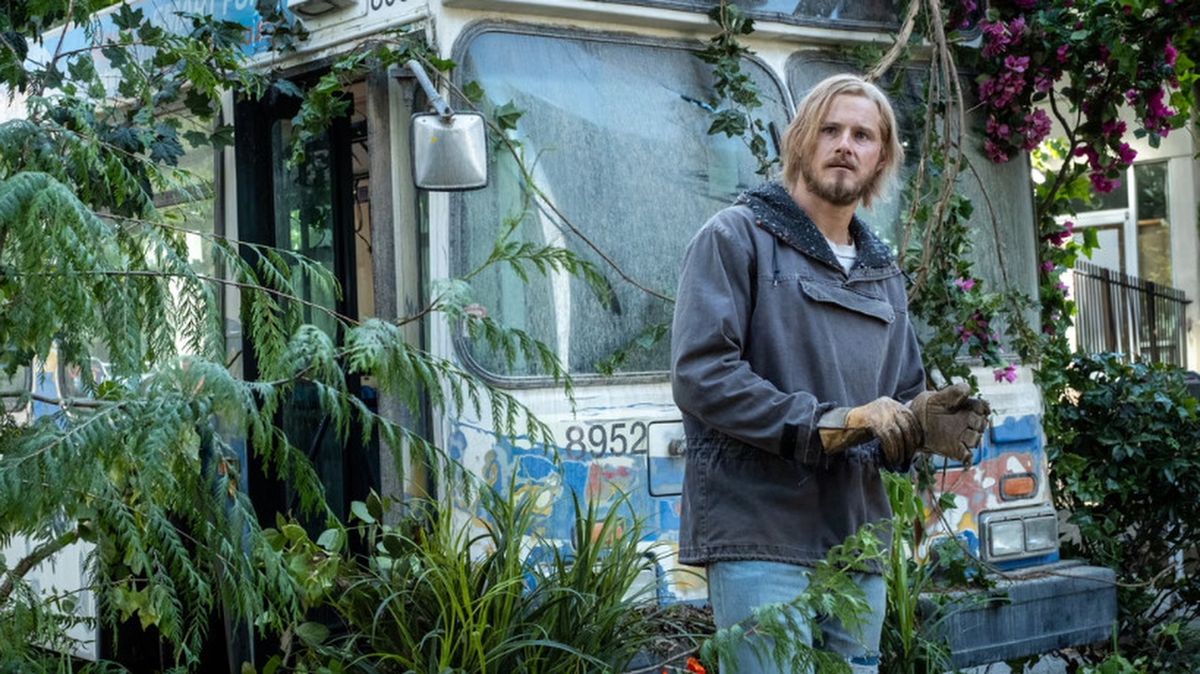I’ve just finished watching MGM Plus’ Earth Abides, and for a post-apocalyptic thriller, it was a nice change of pace to the usual grim battle for survival in a future world plagued by zombies and/or cannibals you find in movies like The Road or the long, plodding The Walking Dead TV series, or where everybody lives underground like Silo or Fallout.
Earth Abides, the TV show, is based loosely on the classic 1949 sci-fi novel of the same name written by George R. Stewart. The story follows protagonist Isherwood ‘Ish’ Williams (Alexander Ludwig), a geology student who is working on his thesis in the mountains somewhere in California. Bitten by a rattlesnake he manages to make it back to his cabin in the woods before passing out in a fever from which he doesn’t wake for days, possibly weeks.
When he does come round, he finds that nature biting back was a foreshadowing of what’s to come. Nature has indeed struck back and he’s completely alone. Civilization has been destroyed by a deadly pandemic; everyone he knows is dead, the streets are empty and the TVs and radios are all quiet. Wandering into the city he finds a couple of oddball survivors who were immune to the virus, but it’s only when he retreats to the suburbs that he finds Emma (Jessica Frances Dukes), a woman who seems to be more adept at surviving in a post-apocalyptic world than he is. They decide to make a life together and he gains direction as they slowly start to build a community around them.
Watch On
If, like me, you trudged through every series of The Walking Dead out of some misplaced sense of duty, only to find out that it essentially repeats the same ‘bad guy’ plot line over and over every season, you’ll find it refreshing that the main focus of Earth Abides isn’t on how humans are inherently selfish and evil, but on how we need to cooperate to survive in nature.
Sure, they occasionally meet other groups, not all of whom have their best interests at heart, but more often than not the goal is simply to stay alive and the people choose to band together because they want to form a community. As humans it appears that working together gives us our best chance of survival – who knew?
While Mary Shelley’s The Last Man was the first post-apocalyptic novel, Earth Abides is most likely the original source material for all the ‘waking up to discover civilization has collapsed’ plot lines that you see repeated again and again in sci-fi and horror – 28 Days Later, I’m looking at you. And talking of classic literature, throughout Earth Abides the value of a good old-fashioned public library is continually emphasized, because if you want to know how to do something in a post-apocalyptic world, like say, install solar panels or deliver a human baby, you can’t simply fire up YouTube. The local library turns out to be a lifesaver.
As the title suggests, throughout it all, the Earth abides. We get to watch nature recover and reclaim the world. As every last brick, fibre-optic cable and bridge that humans have created begins to rot away, cities are turning back into forests and wild animals are frolicking in the streets. There’s plenty of action, heartbreak and drama along the way, but we get to see a world where humans live without the concept of money or a social status to chase after, the survivors slowly lose their hangups and become freer to become the sort of people they really want to be, especially when it comes to human relationships.
If you’re looking for something different for your next binge watch of one of the best Prime Video shows (if you’re in the UK), then I like to think that Earth Abides offers you a more realistic look at a post-apocalyptic future than we’ve seen so far, one where we don’t all instantly default to cannibalism as our first means of survival, and people find out what it really means to be human after all.
Read the full article here















